-
 Bitcoin
Bitcoin $84,912.1002
0.22% -
 Ethereum
Ethereum $1,597.4099
0.99% -
 Tether USDt
Tether USDt $1.0000
0.00% -
 XRP
XRP $2.0848
1.56% -
 BNB
BNB $592.5467
0.52% -
 Solana
Solana $138.6661
3.38% -
 USDC
USDC $1.0000
0.02% -
 Dogecoin
Dogecoin $0.1597
3.32% -
 TRON
TRON $0.2416
-1.86% -
 Cardano
Cardano $0.6327
3.32% -
 UNUS SED LEO
UNUS SED LEO $9.2836
0.56% -
 Chainlink
Chainlink $12.7262
1.41% -
 Avalanche
Avalanche $19.2768
1.31% -
 Stellar
Stellar $0.2442
1.08% -
 Toncoin
Toncoin $2.9950
1.32% -
 Shiba Inu
Shiba Inu $0.0...01231
4.65% -
 Hedera
Hedera $0.1668
2.11% -
 Sui
Sui $2.1474
1.41% -
 Bitcoin Cash
Bitcoin Cash $337.5269
2.68% -
 Hyperliquid
Hyperliquid $17.5726
3.68% -
 Polkadot
Polkadot $3.7336
2.05% -
 Litecoin
Litecoin $76.5245
1.70% -
 Dai
Dai $1.0001
0.02% -
 Bitget Token
Bitget Token $4.4585
2.30% -
 Ethena USDe
Ethena USDe $0.9993
0.01% -
 Pi
Pi $0.6558
7.05% -
 Monero
Monero $214.1926
-0.69% -
 Uniswap
Uniswap $5.2567
1.90% -
 Pepe
Pepe $0.0...07325
4.28% -
 OKB
OKB $50.6926
1.82%
What are the forced liquidation rules for Bitcoin contracts?
Bitcoin perpetual swaps and futures face automated liquidation if margin falls below the maintenance level, a process protecting exchanges from losses. Liquidation prices vary by exchange, leverage, and algorithms, emphasizing the need for careful risk management and understanding platform-specific rules.
Mar 20, 2025 at 04:50 pm
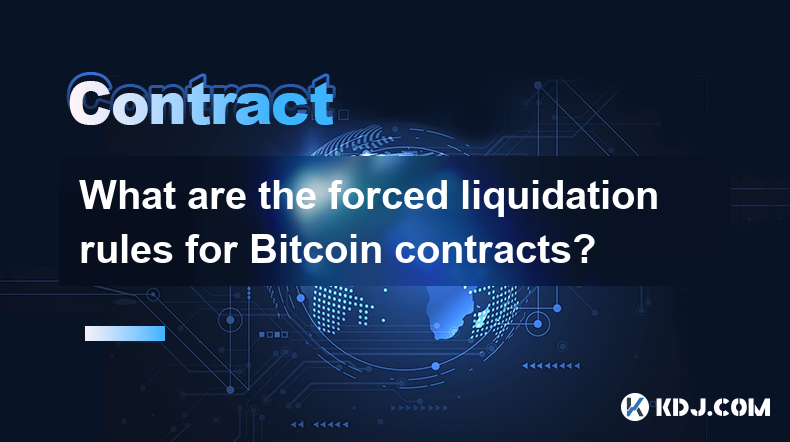
Key Points:
- Bitcoin contracts, primarily perpetual swaps and futures, are subject to liquidation when the margin balance falls below the maintenance margin requirement.
- Liquidation is an automated process triggered by the exchange to protect itself from losses due to adverse price movements.
- The specific liquidation price depends on the exchange's algorithm, leverage used, and the contract's price.
- Different exchanges have varying liquidation rules, so understanding your chosen platform's specifics is crucial.
- Preventing liquidation involves careful risk management, including appropriate leverage, stop-loss orders, and monitoring market volatility.
What are the forced liquidation rules for Bitcoin contracts?
Bitcoin contracts, particularly perpetual swaps and futures, operate on margin. This means you only need to deposit a fraction of the contract's total value to open a position. However, this leverage magnifies both profits and losses. If the market moves against your position, your margin balance – the funds you have available to cover potential losses – decreases. Forced liquidation, also known as auto-deleveraging (ADL), is the mechanism exchanges employ to protect themselves from losses when your margin falls below a certain threshold.
The crucial threshold is the maintenance margin. This is the minimum margin balance required to maintain your open position. If your margin balance drops below the maintenance margin, the exchange initiates the liquidation process. This isn't a manual process; it's automated to react quickly to rapidly changing market conditions. The speed of liquidation is vital as the price could move further against the trader, increasing losses.
The precise liquidation price isn't fixed and is often slightly below the point where your margin falls below the maintenance margin. This "buffer" helps ensure a smooth liquidation and reduces the chance of cascading liquidations, where one liquidation triggers others, potentially destabilizing the market. The exact calculation of the liquidation price varies depending on the exchange's algorithm, considering factors like the leverage used and the current market price of Bitcoin.
Leverage significantly impacts your liquidation risk. Higher leverage magnifies gains but dramatically increases the likelihood of liquidation. A small price movement can wipe out your margin with high leverage. Conversely, lower leverage offers more resilience to price fluctuations, reducing the risk of liquidation. It's important to remember that even with low leverage, significant price swings can still lead to liquidation.
Each exchange has its own set of liquidation rules. These rules may differ subtly or significantly, influencing the precise liquidation price and the speed of the process. Some exchanges might offer more advanced features like partial liquidations, where only a portion of your position is liquidated to bring your margin back above the maintenance margin. Others might have stricter rules, leading to the complete closure of your position.
Understanding your chosen exchange's specific liquidation rules is paramount. Thoroughly reviewing the terms and conditions, and paying close attention to the risk disclosures, is crucial before trading Bitcoin contracts. Ignoring these details can lead to unexpected and potentially devastating losses. Many exchanges provide detailed examples and simulations to help traders understand the mechanics of liquidation.
Beyond the exchange's rules, proactive risk management is key to avoiding liquidation. Using stop-loss orders is a vital strategy. These orders automatically close your position when the price reaches a predetermined level, limiting potential losses. Careful position sizing, avoiding over-leveraging, and constant monitoring of market volatility are equally important.
Market volatility plays a substantial role in liquidation risk. During periods of high volatility, prices can swing dramatically in short timeframes, significantly increasing the chance of liquidation. Traders should be especially cautious during these periods, potentially reducing leverage or closing positions altogether. Staying informed about market news and events that could impact Bitcoin's price is also essential.
The mechanics of how exchanges execute liquidations are often complex and proprietary. While the core principle remains the same – protecting the exchange from losses – the specific algorithms and processes can vary considerably. Transparency regarding these processes differs between exchanges, with some offering more detailed explanations than others. It's always advisable to seek clarification if anything remains unclear.
Understanding the impact of funding rates on perpetual swaps is crucial. These rates adjust based on the difference between the perpetual swap price and the spot price of Bitcoin. Positive funding rates mean you pay to hold a long position, while negative rates mean you receive payments. High funding rates can erode your margin, increasing the risk of liquidation, especially in prolonged periods of market imbalance.
Frequently Asked Questions:
Q: What happens to my funds after liquidation?
A: After liquidation, the exchange uses your margin to cover losses on your position. Any remaining funds are returned to your account. If the losses exceed your margin, you incur a loss.
Q: Can I prevent liquidation?
A: While you can't entirely eliminate the risk, you can significantly reduce it through careful risk management: use lower leverage, employ stop-loss orders, and closely monitor market volatility.
Q: Are all Bitcoin contracts subject to forced liquidation?
A: Most margin-based Bitcoin contracts, such as perpetual swaps and futures, are subject to forced liquidation. However, spot trading generally doesn't involve this risk.
Q: How can I find my exchange's specific liquidation rules?
A: Your exchange's website, usually within its terms and conditions or a dedicated risk disclosure section, will detail its liquidation policies. Contacting customer support is also an option.
Q: What is the difference between liquidation and margin call?
A: A margin call is a warning that your margin is getting low. Liquidation is the automated process of closing your position when your margin falls below the maintenance margin, triggered after a margin call is ignored.
Disclaimer:info@kdj.com
The information provided is not trading advice. kdj.com does not assume any responsibility for any investments made based on the information provided in this article. Cryptocurrencies are highly volatile and it is highly recommended that you invest with caution after thorough research!
If you believe that the content used on this website infringes your copyright, please contact us immediately (info@kdj.com) and we will delete it promptly.
- Ethena Labs Unveils Converge, a New Layer-1 Blockchain Targeting Tokenized Real-World Assets
- 2025-04-19 12:20:14
- FBI Releases Five Warnings to Help Protect Investors in the Cryptocurrency Space
- 2025-04-19 12:20:14
- Today, the Official Trump ($TRUMP) meme coin tokens have been unlocked, sparking panic among investors.
- 2025-04-19 12:15:14
- Dogecoin (DOGE) Price Prediction: Will the Original Memecoin Reach $1 by Late Summer 2025?
- 2025-04-19 12:15:14
- Resilience is a Distinct Attribute of Solana
- 2025-04-19 12:10:13
- Astar Network Adjusts Its Token Issuance Model to Stabilize APY and Reduce Inflation
- 2025-04-19 12:10:13
Related knowledge

How does Tail Protection reduce the loss of liquidation?
Apr 11,2025 at 01:50am
Introduction to Tail Protection in CryptocurrencyTail Protection is a mechanism designed to mitigate the risks associated with liquidation in cryptocurrency trading. Liquidation occurs when a trader's position is forcibly closed by the exchange due to insufficient margin to cover potential losses. This often happens in leveraged trading, where traders b...
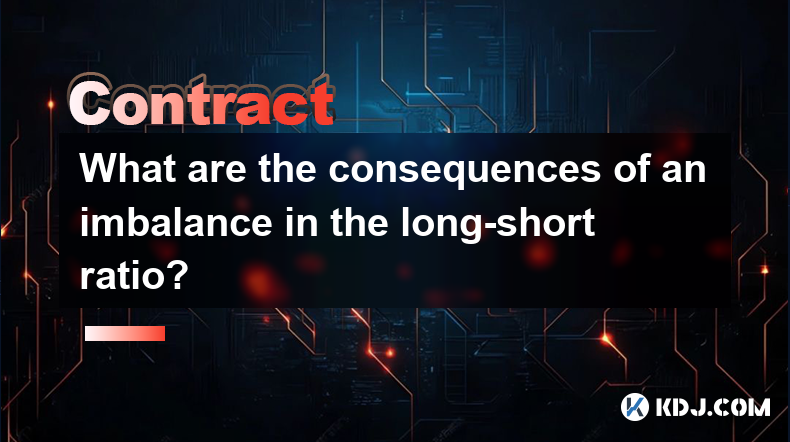
What are the consequences of an imbalance in the long-short ratio?
Apr 13,2025 at 02:50pm
The long-short ratio is a critical metric in the cryptocurrency trading world, reflecting the balance between bullish and bearish sentiments among traders. An imbalance in this ratio can have significant consequences on the market dynamics, affecting everything from price volatility to trading strategies. Understanding these consequences is essential fo...
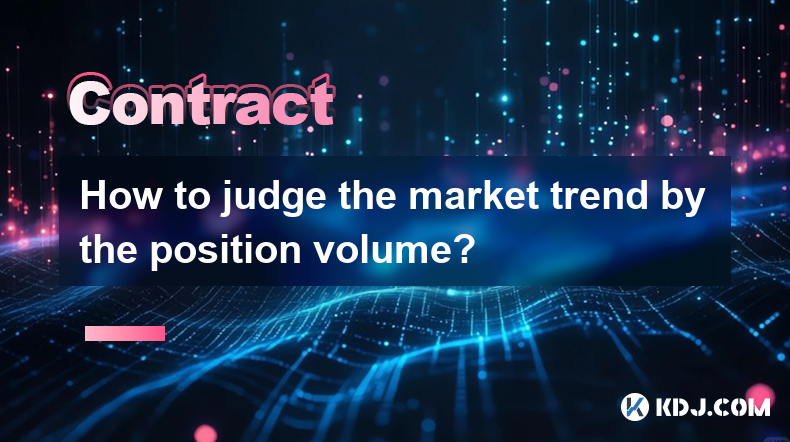
How to judge the market trend by the position volume?
Apr 11,2025 at 02:29pm
Understanding how to judge the market trend by position volume is crucial for any cryptocurrency trader. Position volume, which refers to the total number of open positions in a particular cryptocurrency, can provide valuable insights into market sentiment and potential price movements. By analyzing this data, traders can make more informed decisions ab...

Why does a perpetual contract have no expiration date?
Apr 09,2025 at 08:43pm
Perpetual contracts, also known as perpetual futures or perpetual swaps, are a type of derivative product that has gained significant popularity in the cryptocurrency market. Unlike traditional futures contracts, which have a fixed expiration date, perpetual contracts do not expire. This unique feature raises the question: why does a perpetual contract ...
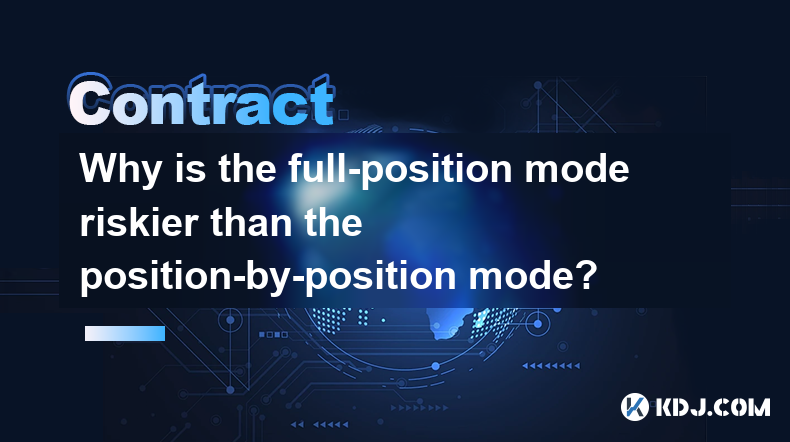
Why is the full-position mode riskier than the position-by-position mode?
Apr 13,2025 at 03:42pm
Why is the Full-Position Mode Riskier Than the Position-by-Position Mode? In the world of cryptocurrency trading, the choice between full-position mode and position-by-position mode can significantly impact the risk profile of a trader's portfolio. Understanding the differences between these two modes is crucial for making informed trading decisions. Th...
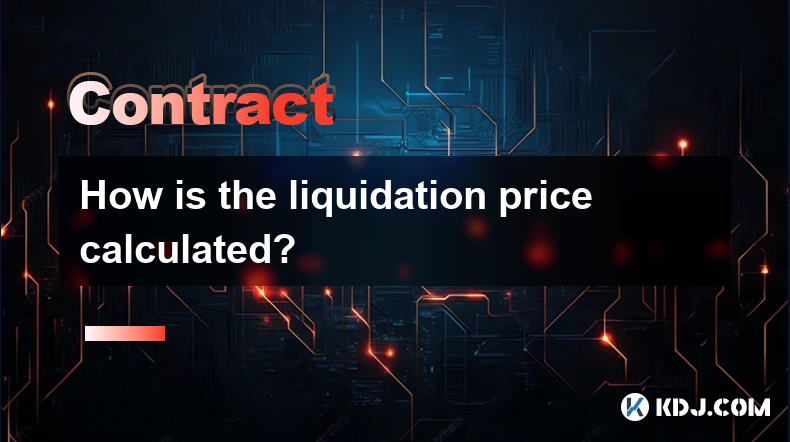
How is the liquidation price calculated?
Apr 12,2025 at 01:35am
Introduction to Liquidation PriceLiquidation price is a critical concept in the world of cryptocurrency trading, particularly when dealing with leveraged positions. Understanding how this price is calculated is essential for traders to manage their risk effectively. The liquidation price is the point at which a trader's position is forcibly closed by th...

How does Tail Protection reduce the loss of liquidation?
Apr 11,2025 at 01:50am
Introduction to Tail Protection in CryptocurrencyTail Protection is a mechanism designed to mitigate the risks associated with liquidation in cryptocurrency trading. Liquidation occurs when a trader's position is forcibly closed by the exchange due to insufficient margin to cover potential losses. This often happens in leveraged trading, where traders b...

What are the consequences of an imbalance in the long-short ratio?
Apr 13,2025 at 02:50pm
The long-short ratio is a critical metric in the cryptocurrency trading world, reflecting the balance between bullish and bearish sentiments among traders. An imbalance in this ratio can have significant consequences on the market dynamics, affecting everything from price volatility to trading strategies. Understanding these consequences is essential fo...

How to judge the market trend by the position volume?
Apr 11,2025 at 02:29pm
Understanding how to judge the market trend by position volume is crucial for any cryptocurrency trader. Position volume, which refers to the total number of open positions in a particular cryptocurrency, can provide valuable insights into market sentiment and potential price movements. By analyzing this data, traders can make more informed decisions ab...

Why does a perpetual contract have no expiration date?
Apr 09,2025 at 08:43pm
Perpetual contracts, also known as perpetual futures or perpetual swaps, are a type of derivative product that has gained significant popularity in the cryptocurrency market. Unlike traditional futures contracts, which have a fixed expiration date, perpetual contracts do not expire. This unique feature raises the question: why does a perpetual contract ...

Why is the full-position mode riskier than the position-by-position mode?
Apr 13,2025 at 03:42pm
Why is the Full-Position Mode Riskier Than the Position-by-Position Mode? In the world of cryptocurrency trading, the choice between full-position mode and position-by-position mode can significantly impact the risk profile of a trader's portfolio. Understanding the differences between these two modes is crucial for making informed trading decisions. Th...

How is the liquidation price calculated?
Apr 12,2025 at 01:35am
Introduction to Liquidation PriceLiquidation price is a critical concept in the world of cryptocurrency trading, particularly when dealing with leveraged positions. Understanding how this price is calculated is essential for traders to manage their risk effectively. The liquidation price is the point at which a trader's position is forcibly closed by th...
See all articles























































































